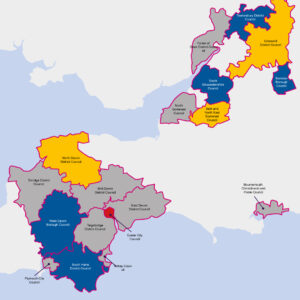It’s been the first official week of the 2019 election campaign and the main political parties faired marginally well. Having said that, it wasn’t without controversy and upset.
Party policies are now flooding radios, T.V. channels and national newspapers up and down the country and all candidates have been announced. This week, Johnson gave a rendition of Queen’s ‘I Want to Break Free’ as he mopped floors in the midlands and Jo ‘Girly Swot’ Swinson gave her best Rocky Balboa impression in the Capital. Labour revealed its ambition to fund the NHS.
One thing is for sure, anything can happen over the coming weeks. The candidates are ready, but is the electorate?
The Conservative Party:
Boris Johnson is finishing this week a little bruised, yet in a far stronger position.
Ex-Conservative MPs Nick Boles and David Gauke came out this week arguing that moderate like themselves should look to the Liberal Democrats at this election. Gauke, suggested that the best option for the country would be to put Johnson’s Brexit deal to the public in a referendum. He would campaign for remain, fearful the UK could still crash out of the EU during the next part of negotiations. Gauke also announced he would contest his seat as an independent.
What was always seen as Johnsons USP, Johnsons public engagements are becoming increasingly frosty. He was heckled when he arrived in the midlands to meet residents affected by the severe flooding and mopped like he’d never mopped before. Some residents refused to talk to the Conservative party leader. Johnson even avoided a scheduled appearance in the South West, because of protesters.
The Party continues to face calls to release details on Russian interreference in UK elections. Former Attorney General Dominic Grieve, was dumbfounded at the decision taken by the Government and he is not alone. Former Presidential candidate Hilary Clinton shared Grieve’s concerns. She said that British voters had the right to know what was going on in their elections. The Government maintain that they are doing nothing out of the ordinary.
In a tactically crucial boost for Johnson’s chances of electoral victory, Nigel Farage the leader of the Brexit Party, performed a huge U-turn this week announcing that his party would not stand candidates in the 317 seats the Conservatives won in 2017. Farage justified his decision citing considerable Liberal Democrat gains. Whilst this was largely welcomed, some Brexit party voters announced that would not vote at all in this election. Johnson was reported to have pushed Farage to stand down in Labour target seats too, but Farage refused.
It is rumored that Johnson offered both Farage and Richard Tice, the party’s Chairman, peerages in exchange. Conservative party Chairman James Cleverly failed to deny the allegation, after it was suggested that up to 8 Brexit party candidates have been offered rewards for standing down. Ann Widdecombe, former Conservative MP and current Brexit party MEP revealed she was offered a job in future negotiations with the European Union. Farage’s decision has seemingly already improved Johnson’s position as he remains ahead of Corbyn in the polls.
The party have been challenged on their immigration position, after Home Secretary Priti Patel announced that the party would seriously reduce immigration. The Party would of course, end free movement of people from the EU if Brexit happens. After this, entry into the UK would depend on the needs of the economy. Patel hinted at a points-based system.
The Labour Party:
Corbyn had a relatively sound week, however like 2017’s election, Labour’s costings have been brought into question.
Shadow health secretary, Jonathan Ashworth announced that the party will outspend the Conservatives by £6bn on the NHS, injecting a total of £26bn in real terms. Funding is said to come from taxing the highest earners. This policy joins previously released plans to abolish all prescription charges and introduce free personal care in England for the elderly.
If polls remain as they are over the next 6 weeks, Corbyn’s chances of electoral success seem unlikely, although he tends to perform better on the campaign trail. Nevertheless, should Parliament be returned hung, Scottish National Party (SNP) leader Nicola Sturgeon revealed that she would be open to an alliance between the Labour party and SNP. Their biggest hurdle is when to hold a second Scottish referendum on independence.
The potential alliance faced large criticism from the Conservatives and Liberal Democrats, who both stand opposed to a second Scottish referendum. When pressed on this further, Corbyn revealed that the option of a second Scottish referendum would not be held in his first term, prompting backlash from Sturgeon who maintains that IndyRef2 must be held sooner rather than later.
Today, Labour submitted that the difference between men’s and women’s average pay would take another 60 years to close under continued Conservative leadership. The Fawcett Society also shared concerns that it would take until almost 2080 for the gender pay gap to close. The party announced that they will set a 2030 target for reducing the gap. Labour referenced conference policy to introducing a ‘real living wage’ of £10 per hour and creating a Worker’s Protection Agency with HMRC, who would have powers to fine failing organisations, to see this policy achieved. This was described as an overpromise by Conservative Liz Truss, Secretary of State for International Trade and Minister for Women and Equalities.
Shadow Chancellor John McDonnell announced plans to provide free broadband for all. Involving the part nationalisation of BT and increased taxation for the tech giants. Whilst McDonnell described it as ‘visionary,’ Boris Johnson called it ‘a crackpot scheme’ and the Lib Dems said it was ‘another unaffordable item on a wish list.’ BT themselves questioned the party’s costings.
The Liberal Democrats:
It’s been a tough week for Lib Dem leader Jo Swinson as the gloves are certainly off. There have been strong criticisms that the party are potentially gifting Brexit to the Conservative party after refusing to stand down candidates in pro-Remain Labour seats.
This comes in the wake of the resignation of Tim Walker, as the Liberal Democrat candidate for Canterbury. Mr Walker stood down as the Parliamentary Paper Candidate on Tuesday, fearful of a Remain spilt. Current MP Rosie Duffield won the seat in 2017, by just 187 votes. The party are set to take disciplinary action against Mr Walker and have already selected his replacement. Swinson and other party officials stood by their decision. They reiterated that they would not put Jeremy Corbyn’s Labour into Government and that Labour refused to join the Remain Alliance. Len McCluskey said that Labour was not a party of Remain.
Despite this, the party announced several policies.
Whilst visiting flood victims, the party leader announced a £5bn flood defense fund, funded by borrowing. They also announced a ‘Skills Wallet.’ The plan is to create a ‘new era of learning throughout life.’ If elected, they will provide an initial £4000 into a person’s skills wallet at 25 years old, £3000 at 40 and a final £3000 at 55. Individuals, employers and local governments will be able to make additional payments. Labour have pointed out that the £10,000 sum only just covers one year of University.
To fight knife crime, a Liberal Democrat government will invest £500m in youth services. Their public health approach would involve identifying risk factors and treating them early on, with youth workers, police, teachers, health professionals and social services. This is an approach already taken in Scotland. Deputy leader Sir Ed Davey announced that the party would spend £100bn to tackle climate change over the next 5 years and pledged to bring back maintenance grants for University students.
Whilst winter sets in and the campaigning intensifies, speculation mounts and uncertainty remains. The First Past the Post system poses a hurdle for both Remainers and Leavers, where pacts and alliances will likely determine the winner. An election is about the future of the country, its next steps for health, education, environment, the economy and every other aspect of life. But this election is being overshadowed by Brexit and no matter how good or how many policies are announced, it is seemingly Brexit that will define this election.


